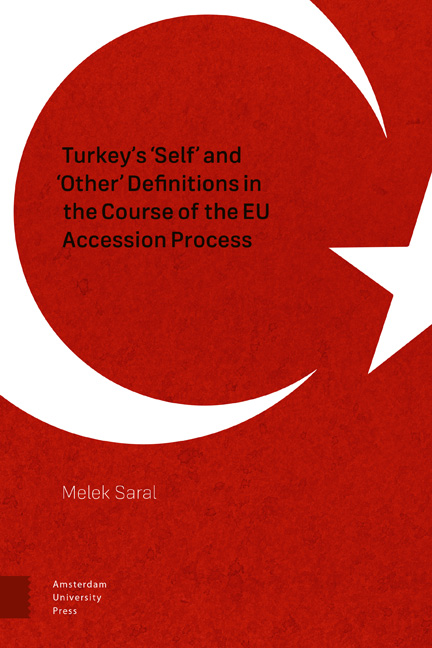Book contents
- Frontmatter
- Contents
- Acknowledgements
- Abbreviations
- 1 Socialization or Estrangement within the Framework of Turkey-EU Relations
- 2 The Concept of Socialization and Identity Change
- 3 New Phase in Turkey-EU Relations: Opening the Door to Europeanness
- 4 The Helsinki Summit: The Recognition of (Muslim) Turkey’s Europeanness
- 5 Start of Negotiations, End of Negotiations
- 6 New Area, New Identity, New Roles: Turkey – European or Middle Eastern?
- 7 Results and Implications
- Bibliography
- Index
1 - Socialization or Estrangement within the Framework of Turkey-EU Relations
Published online by Cambridge University Press: 12 February 2021
- Frontmatter
- Contents
- Acknowledgements
- Abbreviations
- 1 Socialization or Estrangement within the Framework of Turkey-EU Relations
- 2 The Concept of Socialization and Identity Change
- 3 New Phase in Turkey-EU Relations: Opening the Door to Europeanness
- 4 The Helsinki Summit: The Recognition of (Muslim) Turkey’s Europeanness
- 5 Start of Negotiations, End of Negotiations
- 6 New Area, New Identity, New Roles: Turkey – European or Middle Eastern?
- 7 Results and Implications
- Bibliography
- Index
Summary
International Institutions and Identity Change
Social environment and social interactions have a decisive impact on the identity of individuals. Personality and identity are developed by dealing with the social environment. States, like individuals, are affected by interactions with their social environment. Once they enter a social environment, or they interact with other actors, they are never the same (Johnston 2008). Interactions of states with international institutions not only change the normative characteristics and identities of states but, more importantly, shape their interests and their behavior. In international relations (IR) literature this is called the international socialization process during which the norms, rules, values, and ideals of the socializer are adopted by the socializee (Schimmelfennig 2002; Schimmelfennig 2003; Johnston 2001; Risse 2000; Checkel 2005; Flockhart 2006). If the socialization process is successful, it is expected to involve changes in self-conception, in conceptions of ‘in-groupness’ and new definitions of ‘self’ and ‘other.’ In successful socialization, the redefinition of ‘self’ and ‘other’ is consistently upheld and would not change under different circumstances, for example, for strategic or rational considerations (Gheciu 2005: 982).
The claim that the behavior of actors changes because of endogenous change in the normative characteristics and identities of the actors through socialization is a radical statement for IR theory (Johnston 2001; Wendt 1994: 384). If we accept that identity drives behavior, then a change of identity and tracing this change allows us to make assumptions about political actors’ behavior and predict eventual changes, based on their identity. For example, the theory of democratic peace, which assumes that democratic states are more peaceful than other states, also relies on the connection between identity and behavior. It claims that states with a democratic identity are expected to behave according to this identity and they do not demonstrate violent behavior. However, one cannot describe the connection between identity and behavior as linear and a direct causal relationship. Identity and behavior take a rather meandering course. As Wendt puts it, states learn their identities through interactions with others, and these identities shape states’ interests. Identities are significant because they provide the basis for interests (Wendt 1999).
- Type
- Chapter
- Information
- Publisher: Amsterdam University PressPrint publication year: 2017



